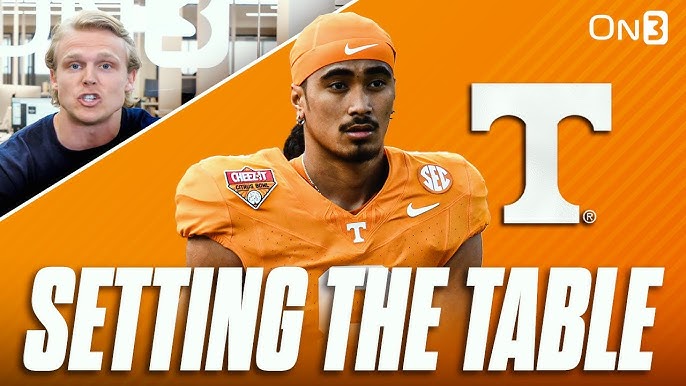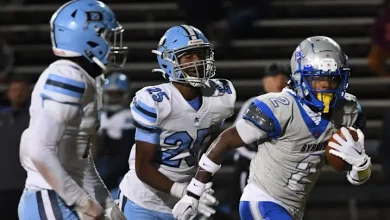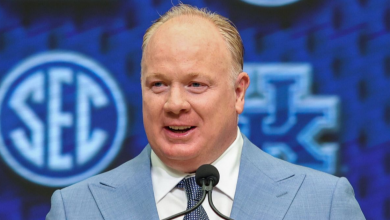Tennessee reportedly parting ways with QB Nico Iamaleava following an NIL dispute, marking a surprising shift in the program.

In a stunning turn of events that has left Tennessee Volunteers football fans and college football enthusiasts buzzing, the University of Tennessee is reportedly parting ways with quarterback Nico Iamaleava, a highly-touted recruit and one of the most anticipated young stars in the sport. According to multiple sources, the decision comes amid an escalating dispute surrounding Name, Image, and Likeness (NIL) compensation. Iamaleava’s exit marks an unexpected shift for the Volunteers program, which had pinned significant hopes on the talented freshman quarterback as the future of the team.
The Rise of Nico Iamaleava: A Star in the Making
To understand the magnitude of this development, it’s important to look at who Nico Iamaleava is and why his time at Tennessee was initially seen as a key turning point for the Volunteers.
Iamaleava was one of the highest-rated quarterbacks in the country, with some even ranking him as the top signal-caller in his class. His pedigree as a recruit was impeccable, having spent his high school career dazzling scouts and analysts with his strong arm, poise under pressure, and athleticism. Iamaleava’s high school resume included leading his team to multiple victories in one of the toughest football regions in the country, and his performances in national showcases solidified his place as a five-star prospect.
Tennessee was thrilled when Iamaleava committed to the Volunteers. He represented a new era for the program, one that had struggled to return to elite status but hoped to turn things around with his arrival. The idea of having a quarterback with Iamaleava’s potential under center was a game-changer for head coach Josh Heupel and the coaching staff, who had recruited him heavily, hoping to build an offense around his skills.
The Impact of NIL on College Football
The controversy surrounding Iamaleava’s departure from Tennessee is rooted in the ongoing evolution of college sports—specifically the changing landscape created by NIL. With NIL deals now a central feature of the modern college athletics world, athletes like Iamaleava have the opportunity to profit from their personal brand, a freedom that was previously unavailable to them. While this represents a significant benefit to student-athletes, it has also led to increased complexity and, in some cases, disputes within programs and between players and schools.
When the NIL rights were granted in 2021, it created a seismic shift in college athletics. Players now had the opportunity to negotiate deals, sign endorsement contracts, and benefit from their social media presence, among other opportunities. For highly marketable athletes like Iamaleava, the possibilities seemed endless. However, with great opportunity comes great expectation, and it appears that the complexity of NIL compensation may have played a pivotal role in Iamaleava’s decision to leave Tennessee.
Reports indicate that tensions began to rise after the player’s NIL compensation demands reportedly clashed with what Tennessee was willing to offer. Iamaleava, who had already gained significant attention from companies looking to capitalize on his name and brand, apparently found himself at odds with the Volunteers program regarding the structure and expectations of his NIL deals. This dispute, sources claim, became a point of contention, leading to the decision to part ways.
NIL Disputes: A New Challenge for College Programs
While Iamaleava’s case may seem like an isolated incident, it is part of a broader trend in college football where NIL disputes have become increasingly common. The promise of NIL deals can be alluring for athletes, but navigating these opportunities requires careful planning and negotiation. College programs are now tasked with balancing the desire of players to maximize their earning potential with the need to stay within the constraints of NCAA guidelines and institutional policies.
In some cases, schools have faced internal struggles about how to approach NIL. Do they rely on collectives—groups that pool donations from alumni and boosters to support player NIL deals—or do they try to control the process internally? As more players push for higher earnings and more lucrative deals, tension can rise, especially when players feel that the expectations for their on-field performance don’t align with the opportunities they’re being provided off the field.
For Tennessee, Iamaleava’s case represents an early example of the challenges these new dynamics can introduce. While many expected the rise of NIL to create opportunities for players, it’s clear that the financial side of college football has introduced an additional layer of complexity that schools, athletes, and coaches are still learning to navigate.
The Fallout at Tennessee: What This Means for the Program
Tennessee’s decision to part ways with Iamaleava is a surprising one, given the high expectations surrounding the young quarterback. The Volunteers were counting on his development to help them return to prominence in the SEC and national football conversations. As the leader of Heupel’s high-powered offense, Iamaleava was expected to bring both stability and star power to the program.
Now, with Iamaleava’s departure, Tennessee is left with a significant void at the quarterback position. The team had hoped that Iamaleava would be the centerpiece of its future, but now, the Volunteers’ coaching staff will need to quickly pivot and make a decision about how to fill that role. In the short term, Tennessee will likely turn to its other quarterbacks on the roster, but the loss of a highly-rated recruit like Iamaleava could have long-term consequences for the program.
Tennessee had already been navigating a delicate balance when it came to recruiting and roster management under Heupel’s tenure. While the program has shown signs of improvement, the loss of a player with Iamaleava’s potential could delay some of the progress the team had hoped to make. It also raises questions about the long-term effects of NIL on Tennessee’s ability to retain top talent. If NIL disputes continue to pop up, the Vols may find it more difficult to recruit and hold on to elite prospects in the future.
The Transfer Portal: A Potential Solution?
One of the most immediate options for Tennessee to address Iamaleava’s departure is the transfer portal. With the NCAA’s recent policy allowing players to transfer freely and immediately without penalty, many programs are turning to the portal to fill holes in their roster. Tennessee, being a powerhouse program, could easily attract quarterbacks who are looking for a fresh start or a chance to play in a more competitive environment.
The Vols may turn to the transfer portal in search of a replacement for Iamaleava, but it will depend on several factors. First, Tennessee will need to assess the availability of talented quarterbacks who could fit into Heupel’s system. Secondly, the Volunteers will need to make sure that they have the financial backing and support from their boosters to maintain their own NIL programs and keep future recruits happy.
The transfer portal has changed the way college football teams build their rosters, and Tennessee will need to adapt quickly to stay competitive. In a year where the Vols were hoping to challenge for an SEC title and potentially make a playoff run, Iamaleava’s departure is a significant setback, but it’s one that can be mitigated through savvy recruiting and roster management.
The Bigger Picture: NIL’s Role in College Football
Iamaleava’s exit highlights a larger trend that is likely to continue shaping college football in the years to come. While NIL deals provide opportunities for athletes to profit off their names and likenesses, the relationship between players, schools, and their financial backers can lead to complex dynamics and disputes. Iamaleava’s situation may be one of the first high-profile examples of this new reality, but it certainly won’t be the last.
As the NIL landscape continues to evolve, schools will need to find ways to balance player compensation with the traditional structure of college athletics. The rise of collectives and third-party organizations has only added to the complexity of NIL deals, and there is still much to be learned about how to structure these deals in a way that benefits both the athletes and the institutions.
At the same time, players like Iamaleava are setting new precedents for how NIL can be leveraged to maximize their earning potential. As the rules around NIL continue to evolve, it’s likely that more players will follow Iamaleava’s lead and make decisions based on both their football future and their financial opportunities. It’s a new era of college football, one that offers great opportunities but also presents unforeseen challenges.
Looking Ahead: What’s Next for Tennessee?
While the immediate focus for Tennessee will undoubtedly be on their upcoming games and their march through the rest of the season, the loss of Nico Iamaleava will have long-term implications for the program. Head coach Josh Heupel will need to regroup and retool his quarterback room, which may involve looking to the transfer portal for a capable replacement or developing the talent already on the roster.
In the broader context, Iamaleava’s departure also forces Tennessee to re-evaluate its approach to NIL. Going forward, the Volunteers will need to ensure that they strike the right balance between offering competitive compensation packages and maintaining a cohesive team culture. The program will also need to address the broader implications of NIL disputes and how they can maintain a healthy and successful recruiting environment in the future.
Despite the setback, Tennessee’s football program is resilient, and while Iamaleava may no longer be part of the team’s future, the Vols are still in a position to succeed with the right leadership, talent, and support from their fanbase and boosters. It’s a new era for college football, and for Tennessee, the road ahead remains filled with potential—albeit with a few new hurdles to overcome.









